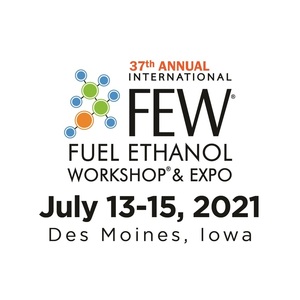More than 450 biofuel producers set to attend FEW

July 9, 2021
BY BBI International
The 2021 International Fuel Ethanol Workshop & Expo (FEW), the ethanol industry's largest conference, will feature more than 150 speakers, next week, July 13-15, in Des Moines, Iowa at the Iowa Event Center. Now in its 37th year, the FEW will provide the global ethanol industry with cutting-edge content and unparalleled networking opportunities in a dynamic business-to-business environment. The FEW has and will continue to be the largest, longest running ethanol conference in the world—and the only event produced exclusively by Ethanol Producer Magazine.
In addition to the main program agenda, the conference will include two pre-conference events and two co-located events. The two pre-conference events are titled, “Ethanol 101” and the “Low Carbon Efficiency Summit.” “Ethanol 101” serves as a one-day in-depth survey of the history, science, production, and market basics of the ethanol industry. The agenda includes some of the industry’s most recognized professionals and will provide a forum to meet and network with them. The “Low Carbon Efficiency Summit” is a day-long workshop that will include discussions about the technical aspects of driving down a plant’s carbon intensity, as well as the processes required to properly document those efforts and strategies for marketing these carbon-reduced fuels to the market.
“Each year our staff is amazed at the innovation within this industry,” said Tim Portz, program director at BBI International. “This year we had a very large number of abstracts submitted, which allowed us to produce four solid program tracks containing presentations from some of the industry’s top minds, as well as two comprehensive pre-conference agendas.”
This year’s FEW in Des Moines is expected to draw nearly 2,000 attendees, including ethanol producers, biodiesel and renewable diesel producers, biomass and biogas producers, industry suppliers, service providers and researchers from around the world.
“We had a sense, but we weren’t 100 percent sure how the show was going to playout this year, due to all of the unknown variables,” said John Nelson, vice president of operations, marketing and sales at BBI International. “However, we currently have 301 exhibitors, which makes the number of companies exhibiting larger than we had in 2019. We are extremely happy with the number of companies wanting to share new technologies or services with the nearly 450 producers registered.”
During the event, speakers will discuss issues categorized into four tracks and two co-located events:
Advertisement
Track 1: Production and Operations
Track 2: Leadership and Financial Management
Track 3: Coproducts and Product Diversification
Advertisement
National Biomass Conference Summit
Producers of ethanol, biodiesel, renewable diesel, biogas, RNG, biomass power and heat, pellets and advanced biofuels receive unlimited complimentary registrations to attend all sessions, including the pre-conference and co-located events.
Visit www.FuelEthanolWorkshop.com to view the agenda online.
Related Stories
The USDA significantly increased its estimate for 2025-’26 soybean oil use in biofuel production in its latest World Agricultural Supply and Demand Estimates report, released July 11. The outlook for soybean production was revised down.
The U.S. Energy Information Administration maintained its forecast for 2025 and 2026 biodiesel, renewable diesel and sustainable aviation fuel (SAF) production in its latest Short-Term Energy Outlook, released July 8.
XCF Global Inc. on July 10 shared its strategic plan to invest close to $1 billion in developing a network of SAF production facilities, expanding its U.S. footprint, and advancing its international growth strategy.
U.S. fuel ethanol capacity fell slightly in April, while biodiesel and renewable diesel capacity held steady, according to data released by the U.S. EIA on June 30. Feedstock consumption was down when compared to the previous month.
XCF Global Inc. on July 8 provided a production update on its flagship New Rise Reno facility, underscoring that the plant has successfully produced SAF, renewable diesel, and renewable naphtha during its initial ramp-up.
Upcoming Events










